Juliet's J-Rock Report #1 - April 2025
In this issue: some background info, a profile of one of my favorite Japanese bands, song reviews, and more!
Thank you for checking out “Juliet’s J-Rock Report”, a monthly newsletter about Japanese punk, rock and other music I’ve found and enjoyed lately!
Here’s what you can expect from this and/or future issues, which will drop on the 6th of the month[1]:
A long-form deep dive covering a specific artist, show, subgenre (or all three!)
A handful of song and/or album reviews
A guest feature from my lovely partner Jeremy, author of “The Deenz List”
This first issue will be a little long, but bear with me – I want to give some context on why I’ve taken on this project in the first place.
[1] The joke here being that the Japanese word for the number six 六 is pronounced “roku”, which kind of sounds like “rock”. I also needed to force myself to have a deadline so I’d actually make this thing happen and attempt to stick to a semi-consistent schedule.
A Brief Disclaimer re: Translation
I first began my Japanese studies in April 2023, and since then have pursued them through a variety of apps, online classes, and textbooks[1], which at present have put me at what I’d call an Advanced Beginner-Low Intermediate level. I’ve learned about 1200 kanji and 4000 vocab words in the subsequent two years and while I’d say I generally understand the core fundamentals of grammar and sentence structure, I’m still a long way off from being anywhere close to fluent. As such, while I will try my best using my existing knowledge and the resources at my disposal[2], please take my translations of lyrics, album and song titles with a grain of salt. There will be linguistic and cultural nuances that are lost in my translations, especially in works that address complex and sensitive topics. For future issues, I may try to find a native speaker who is willing to review my interpretations. Likewise, if you’re a native speaker and have corrections for me, please reach out! In any case, for now please bear with me – consider this a learning experience for all of us!
[1] If people are interested at some point I can do a meta-issue on my experiences specifically with learning Japanese and the tools I’ve used to do so
[2] As a general rule, I do not use ChatGPT or any GenAI programs, though I will use Google Translate to cross-check from time to time
Same Same But Different - An Introduction
As some of you may know, I used to be a Music person. After picking up guitar at age 10, discovering Led Zeppelin at age 12, hearing Radiohead at age 13, then finding PJ Harvey at age 14, I spent the bulk of my adolescence and young adulthood fixated on rock, punk, hardcore, riot grrrl, noise rock, alternative, “indie”, whatever you want to call it. I practiced guitar, made fanzines, did music after-school programs in high school then started my own bands in college, spent weekend afternoons shopping for records, went to DIY shows and photographed them for music websites, trawled the web for Blogspots with Mediafire download links for increasingly obscure artists, and connected with likeminded obsessives on Tumblr, finding solace in one another as we had few friends IRL who could understand our fixations.
As a teenager, I fantasized about a future, and maybe even a career in this realm; I thought the rest of my life would be like this. But as I got older and dove deeper into geography, urbanism, and transportation by my junior year of undergrad, music was no longer my main priority. As more time passed, I’d begun to relate to it less as my life’s meaning, and more as a source of complicated feelings and cringeworthy reminders of adolescence. I still listened to music, but not quite in the same way.
Armed with my new linguistic knowledge, I first dove headfirst into the rich world of Japanese music in early 2024, about eight months after I began my language studies. I found new bands that reminded me of the artists I’d once obsessed over, but with their own distinctive sounds and perspectives – familiar, and yet not quite. Over the past year, this deep dive has been a deeply emotional experience; it’s allowed me to reconnect with my love of music (and even, to some degree, my younger self) while cutting through the baggage and embarrassment I’d long associated with it.
I created this newsletter to share the fruits of my research with my wider world, especially those who are curious but could use some guidance on where to start. I’ll be focusing on artists that I’ve found fun and interesting, with emphasis on those who’ve received little English-language coverage. These artists are great and deserve international attention; I hope to at the very least broaden your musical horizons a little while helping these groups broaden their audiences too.
Feature: Top Secret Man
At 6pm on Saturday May 25th 2024, I was hungry, dehydrated, nervous, excited, and sleep-deprived to the point of near delusion, and I had just cleared passport control at Tokyo Haneda Airport. As this trip that I’d prepared for in some capacity for well over a year was about to unfold before me, I had exactly one goal in mind – haul my ass to the hotel by Tokyo Station as fast as humanly possible in order to haul my ass to the other side of town to a basement bar in Shimokitazawa called Basement Bar by 9pm in order to see one of my favorite Japanese bands, Top Secret Man. Any normal human, after a nearly 24-hour travel odyssey spanning two continents, a bus, a Mobile Lounge[1], and at least three different train lines, would typically just crash and burn at the hotel, but as someone with clinically-diagnosed Built Different Disorder[2], I had to hit the ground running. There was clearly something about this band that had me traipsing across the world’s largest city within hours of my arrival to throw myself into a potentially strange situation in a place I’d never been – so, what was it?
Top Secret Man (トップシクレットマン, pronounced “toppu shikuretto man” in Japanese) are a punk band, loosely speaking, from Saitama (just north of Tokyo), presumably named after the 1980 song by Japanese New Wave group The Plastics[3]. They first started in 2019, but began to pick up steam in 2023 after releasing a string of singles and EPs paired with a relentless touring schedule that has garnered them six-figure view counts on their music videos, sold-out shows, festival slots, and a still-relatively-small-but-quickly-growing fanbase.
Bridging a variety of influences such as hyperpop groups like 100 Gecs, Japanese punk and metal bands like Maximum the Hormone, Melt-Banana and The Mad Capsule Markets, and western bands like Nirvana and Atari Teenage Riot[4], Top Secret Man has a sound that frontman and songwriter Shinoda Ryousuke refers to as “hyperpop x melodic hardcore”[5]. While often distorted and abrasive in feel, their songs can be surprisingly tuneful, putting the “melodic” in “melodic hardcore”. Most of them have catchy hooks, sing-along choruses and sometimes even brush up against ska and pop-punk.
The band takes a self-consciously DIY, lo-fi approach in their music, production, and aesthetics, which run the gamut from self-produced recordings and home-screenprinted band tees to music videos in which Shinoda aggressively sings in his bedroom beneath pixelated graphics over a low resolution video, lyrics displayed in half-width script. The latter[6], combined with Top Secret Man’s logo - the band’s name written in blocky, messy handwriting that’s hard to read even in Japanese – can be found in pretty much everything that the band has released, giving them a distinctively shitpost-y, collage-esque identity that’s immediately recognizable in a show poster or Instagram reel.
It's now 8pm JST and I’m on the Chiyoda line headed to Shimokitazawa, Tokyo’s heart of live music, my own heart pounding with anticipation. Upon arrival at the station, teeming with life on a balmy Saturday Spring evening, I completed my first mission – psyching myself up to, and then successfully ordering famichiki in Japanese at the konbini[7]. The next step was to walk about ten minutes south of the station to a random bar to pick up my actual ticket (and drink ticket) for the show, then walk another ten minutes further south to the aforementioned basement bar called Basement Bar.
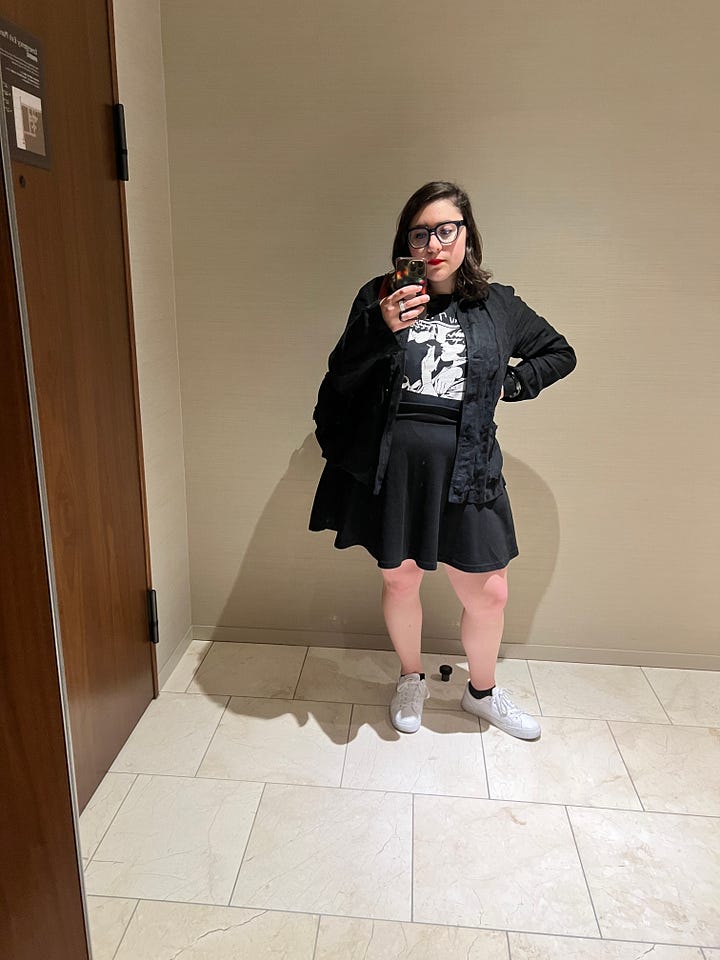
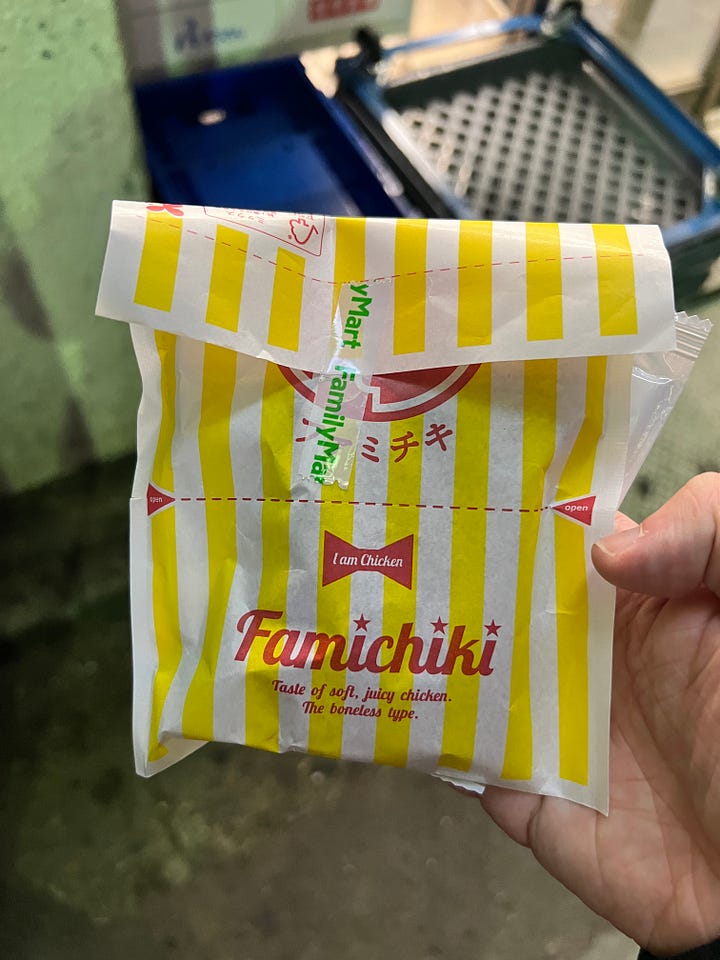
I was a bit apprehensive about going in the minimally-marked venue at first, but once I stepped inside, I immediately felt at home – even halfway across the world, DIY-adjacent music venues have a recognizable look and feel, and this definitely wasn’t my first rodeo. Buzzing off the one-three punch of sleep deprivation, adrenaline, and the nama biiru (draft beer) I had just acquired with the drink ticket that came with admission, I was positively giddy by the time the band walked out onto the stage that was just barely big enough to fit all five of them. I hadn’t been this excited for a show in years, and I must’ve had the dumbest smile on my face as I heard them play the opening notes (or rather, feedback screeches) of a song that a few short months ago I never thought I’d hear live.
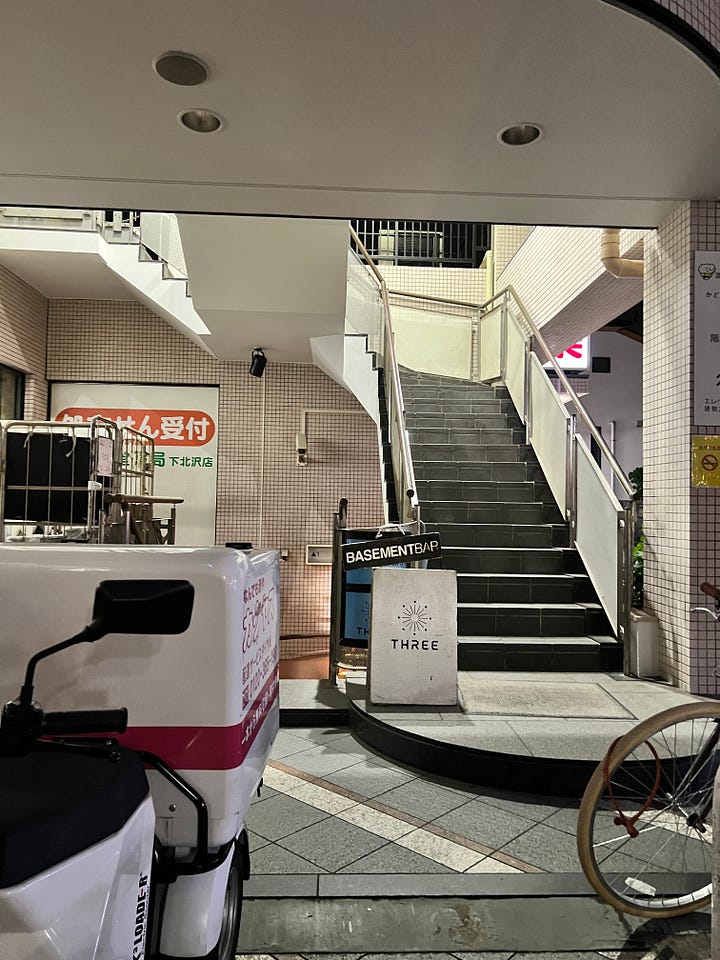
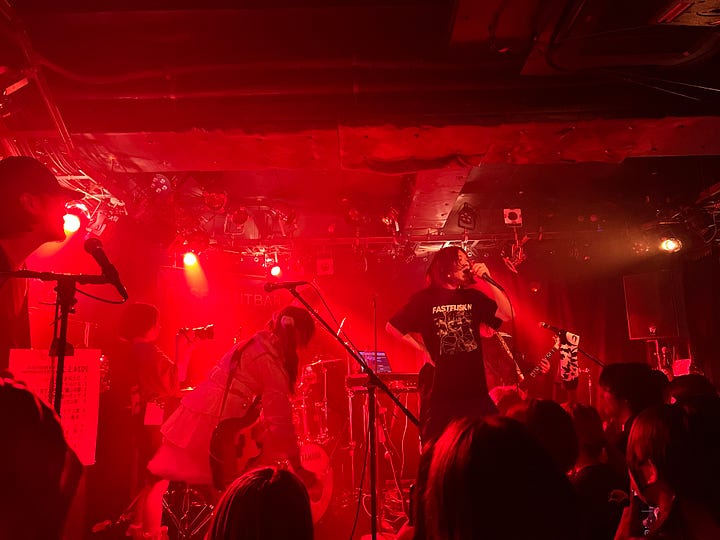
You may have heard online at some point or another that Japanese concert audiences are notoriously calm and respectful – not screaming or cheering loudly, just clapping quietly and watching politely. Thankfully, this was unequivocally not the case at punk shows, least of all this one. Before arriving in Tokyo, I’d watched a bunch of their live sets online and knew what to expect[8]. An enthusiastic audience jumped up and down, chanted along to the lyrics, and pumped their fists in unison. A man wearing a back brace crowdsurfed all the way up to the stage. They ran through a tight set, playing fan favorites with funny and provocative titles like:
ファーストバージンさよなら (“Sayonara Fast Virgin”)
サッカー部のサノくんを倒す曲 (“Song to Defeat Sano-kun from Soccer Club)
現:自己嫌悪 (“Present: Self Loathing”)
僕の心臓をフェラしてくれ (“Give My Heart a Blowjob”)
キミがキミでいってほしいから (“Because I Want You to be You”)
「死にたい」とか絶対言えない (“I Can Never Say ‘I Want to Die’”)
スペルマライフ (“Cum Life”)
As implied by some of these, Top Secret Man pushes boundaries and edges up against taboos both sonically and lyrically. It’s worth noting that their 2023 EP, titled 「漫喫、レイピされた先輩へ」(“My Senpai was Raped at the Manga Cafe”[9]), the album art for which features a woman, legs spread in a bathtub with fake blood all over[10], and has songs with lyrics addressing topics like sexual violence, self-loathing, and suicidal thoughts, was pulled from Apple Music in February of 2024, and Spotify by December.
Though definitely questionable to the point of feeling a bit edgelord-y, I get the sense that they’re being deliberately provocative in the tradition of 80s and 90s alternative bands like Big Black, Nirvana, and the Butthole Surfers. In a 2024 interview with Rolling Stone Japan, Shinoda mentions that “[his] interests at the time [he recorded the 2023 EP] are of course different than his current creative interests”, which if anything has moved more towards topics around mental health (“Present…”), accepting others for who they are (“Because…”), and reminding yourself that you need to stay alive (“I can never say…”). Despite the depressing or even disturbing nature of some of Shinoda’s lyrics, like all good punk songs, when played live with the full band and the whole crowd singing along take on a totally different tenor. When Jeremy and I screamed along at the top of our lungs to the “YOU WILL ALWAYS BE A LOSER” refrain from the classic Titus Andronicus anthem “No Future Part 3: Escape from No Future” at their show in DC back in 2021, a song about loneliness and misery transformed into a cathartic group ritual. WE will always be losers, and that’s okay!
Three weeks after I saw Top Secret Man at Basement Bar on my first day in Japan, I saw them once more on my last day in Japan. They were playing Yatsui Fest, a two-day music-and-comedy extravaganza hosted by a charismatic, pug-owning comedian named Ichiro Yatsui, held across a somewhat surreal two-block area just south of Shibuya that was comprised almost exclusively of tightly-packed music venues and love hotels. Their set was at 12:15pm on a Sunday, and the line to get into Spotify O-Crest was out the door. I just barely made it into the venue, which was up at least six flights of stairs and packed so full of people that it was probably on the verge of a fire code violation. It was as fun and high-energy as the first show, even when we were all stuffed in like sardines. And in the months since, their profile in Japan has only risen as they continue to sell out shows and release new singles and remixes.
Top Secret Man, at their core, are edgy in affect, but earnest in intent – abrasive, ironic, shitpost-y yet unapologetically themselves; DIY in their sonic and visual aesthetics but driven by an honest love for music and desire to pursue their interests. As someone who has spent the better part of the last fifteen years marinating in terminally-online brain rot across multiple platforms but at the same time, like, genuinely cares about things, I too have spent much of my life walking the tightrope between irony and sincerity. “I hope that I’m able to 100% continue to do the things I want to do” concludes Shinoda in his Rolling Stone interview. For our sake, I sure hope so as well.
[1] This one’s for Real DMV and/or Eero Saarinen-heads
[2] I don’t think I coined this phrase but it’s one I’ve found myself using a lot over the past few years or so
[3] I didn’t see any explicit confirmation of this in any of the interviews I read with them, but I would be genuinely shocked if they were named after anything else
[4] All of these were mentioned as influences by Shinoda Ryousuke in his interview with Rolling Stone Japan
[5] Taken from this interview with Shinoda Ryousuke and drummer Suga Chang
[6] I wasn’t able to find a good English-language source on this outside of this one Reddit post, but my sense is that people use half-width characters in memes to convey an ironic or jokey tone
[7] “Konbini” (convenience store) is what’s called wasei-eigo – a “Japanese-made english word”. There are a ton of these, and they’re one of my favorite parts of learning Japanese.
[8] This live set, the final show of their Fall 2024 tour, is a banger from start to finish. Would recommend for the full TSM experience.
[9] The grammar of this phrase makes it a bit tricky to translate literally. This could potentially also be “To my senpai who was raped at the manga café” or “To the manga cafe where my senpai was raped”, though I’m not sure how much it changes the general meaning.
[10] The pencil-drawing censored version lives on as the Youtube thumbnail
Song Reviews
Maximum The Hormone + Atarashii Gakko! - Shimi
When I caught the avant-garde J-Pop girl group Atarashii Gakko! (full name 新しい学校のリーダーズ, lit. “New School Leaders”) when their US tour came to DC last October, they introduced their set by screening the music video for this collaboration they did with Maximum The Hormone, a popular and very influential Japanese metal band (see: Top Secret Man profile), and it was an incredibly effective Hype Generator.
Pairing a girl group with heavy metal instrumentation isn’t exactly a novel concept, but this collaboration elegantly balances the sounds and strengths of both groups. The heavy riffs and gang vocals on Shimi’s (シミ, lit. “Stain”) verses give way to a calm pre-chorus that ramps up to the triumphant refrain. The loud-quiet-loud song structure elegantly builds and releases tension, creating a push-and-pull that also gives space for each of the four members of Atarashii Gakko to have their own solo moment (one of which is a rap verse over a shamisen-based beat). But the song isn’t solely back-and-forth - the girls’ shouts and chants over the metal parts toward the end of the song add a lovely sonic texture and energy. Loud, melodic, triumphant, and massive in all aspects of its production – a fantastic collaboration all around.
ANORAK! - Fledgling
ANORAK!’s newest single, “Fledgling”, finds them playing to their strengths as they settle into the post-hardcore sound they’d flirted with on “New Grass”, the lead single to their 2024 album, Self-actualization and the ignorance and hesitation towards it. While their excellent 2022 self-titled debut LP stayed firmly in the realm of twinkly-shouty Midwest Emo Revival, I was pretty excited to hear how they’d moved towards an angrier and heavier sonic palette with “New Grass” and eagerly awaited a full album of that. However, on Self-actualization… they instead toyed with a more dance/electronic sound, which I personally found to be a bit half-baked and somewhat underwhelming compared to their heavier stuff.
That being said, I was thrilled to hear “Fledgling”; with its echoes of Unwound-meets-Smashing Pumpkins, the riffage is heavy, the cymbals clatter, and the sound is cold and dissonant yet still melodic all at once. I’m really excited to see where ANORAK! goes from here; they’re clearly talented musicians, and while this particularly sound isn’t necessarily the most novel, it’s one I’ve always loved, and they do it incredibly well.
Yureruwayurei - Point Nemo
The best shoegaze songs have what my partner Jeremy describes as a “yeet-me-into-the-sun”-type sound, and this one is no exception. Much like its title, a nod to the farthest point in the Pacific Ocean from any continent or human being, the reverb-drenched vocals and hazy, shimmering guitars feel like diving headfirst into a massive expanse of water. Simultaneously distant and warm, lonely and comforting, this song begins quietly and slowly adds layers of instrumentation, cresting gentle waves of feedback and distortion that culminate in a half-time breakdown at the end. Headphones recommended.
LE SSERAFIM - Crazy (Japanese Ver.)
Le SSERAFIM, the international K-Pop girl group sensation may feel out of place in a list like this, and to be fair, they are. But after spending this issue almost exclusively covering heavy, distorted, and/or dissonant music, I wanted a bit of a palate cleanser, so hear me out. This song is a goddamn earworm. For whatever reason, the refrain “All the girls are girling girling”, is not only catchy but also deeply funny to me, and overlaid on a relentless house beat that might as well have been grown in a lab for drag queens to vogue over brings it into Certified Banger territory. This song has become a staple of my Bluetooth Speaker Bike Playlist, and I’d recommend you add it to your own equivalent exercise-and-or-hype-type one as well.
Closing Thoughts
If you’ve managed to make it all the way to the end of this newsletter - thank you! A few final notes:
I have a playlist of Japanese music that I’ve been periodically adding to since January 2024 called nihongaku - a portmanteau of nihon (“Japan”) and ongaku (music) if you’d like more songs to check out.
In the next issue, my lovely partner (and author of “The Deenz List” substack) Jeremy Munro will have a special guest feature about a song that means a lot to him, which unfortunately wasn’t ready in time for the publication of this volume.
I welcome feedback of all kinds, as well as suggestions of songs and musicians to cover - feel free to send them my way!
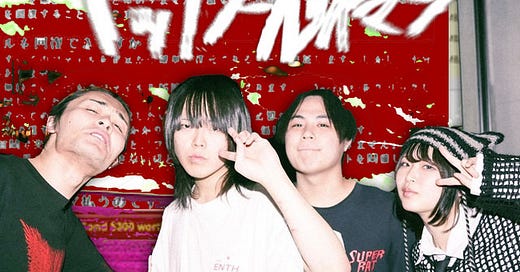


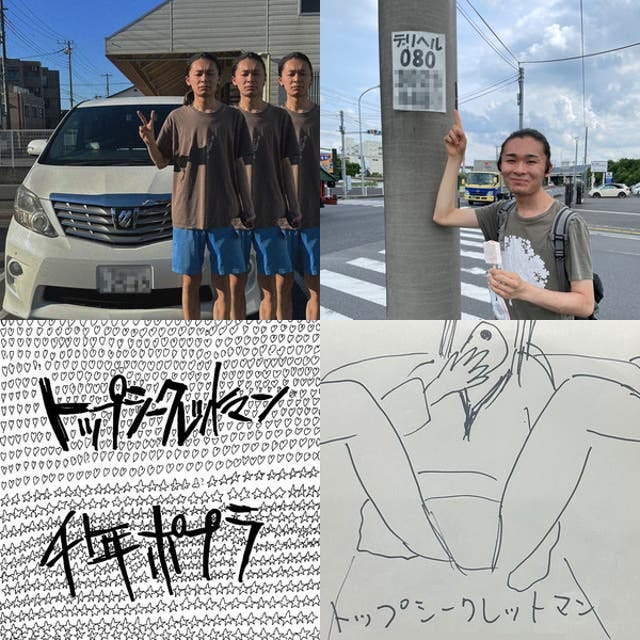

This is how I learned why the Top Secret Man's ep isnt on Apple Music anymore